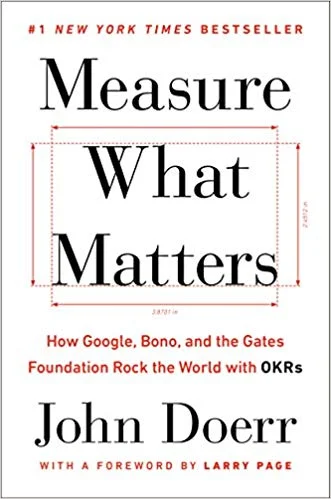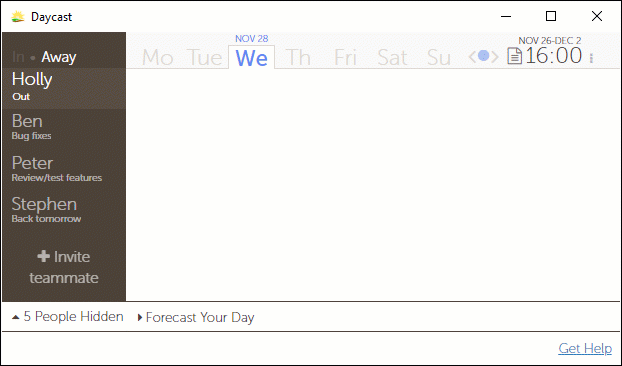Your goals toolkit for 2019
/Update 6/1/2019: We wrote this blog post with good intentions. We’re goal-setters ourselves and wanted to share the things that help us achieve them. Then we heard Jason Fried talk about goals and began to question if our focus on them aligns with our time management philosophy. Here’s the thing: It’s not about accomplishing as much as you can; it’s about using time intentionally. If goals help you spend your time in ways that are most fulfilling to you, by all means, set ‘em. But if you’re someone for whom goal-setting is a gateway to hustle culture, please—skip over numbers one and two in this post. And read this. You are so much more than what you achieve.
You’ve got things you want to accomplish this year, things that aren’t likely easy or you wouldn’t have set goals for them—you’d have just done them. We’ve got a tidy list of six simple but powerful tools to help you hit your targets and have your best year yet.
1. Measure What Matters
by John Doerr
What it is: Dubbed the “handbook for setting and achieving audacious goals,” this book lives up to its hype. You’ll learn the simple but powerful approach to goals that’s proving to be a game-changer for individuals, teams, and whole organizations.
Why you need it: It isn’t enough to set a goal and give it the old college try. You need a system you can rely on to focus your efforts and sustain your motivation over the long haul. Doerr’s objectives and key results (OKR) method delivers both.
Investment: 8 hours of reading time
2. A goal tracker
What it is: A simple spreadsheet or full-featured software like Lifetick or Perdoo … a goal tracker is a tool for checking in regularly on your goals and tracking progress. Aim for no less than one check-in session per month.
Why you need it: Yearly goals aren’t meant to be achieved immediately. Advancement towards the target is gradual. If you don’t track your progress, you’ll be hard-pressed to see that you’ve made any. And that’s where discouragement sets in. This is why most New Year’s resolutions die an untimely death, not because of lack of discipline.
Investment: 1-4 hours per month
3. A day planner
What it is: Whether you take an analog or digital approach (pictured: Daycast), day planners are like sketch pads for time and tasks. Use one to rough out your day ahead of time (we recommend the night before), including actions that will move you towards your goals.
Why you need it: While plans aren’t meant to be followed to the letter, planning daily is key to keeping your goals on your radar and maintaining steady, incremental forward momentum. Unless you intentionally carve out space in your day for this effort, achieving your goals will remain an aspiration and not reality.
Investment: 30 minutes per day at most
4. Meditation
What it is: Once the sole purview of mystics and their students, meditation is a mindfulness practice that’s increasingly common for business leaders who want to lower stress, boost creativity, regulate emotions, and more.
Why you need it: While the benefits of meditation run the gamut of physical, mental, and emotional boons, one stands out as particularly useful in the context of goals—just 10 minutes a day improves cognitive function. In other words, you’ll think more clearly.
Investment: 10 minutes per day
5. Deep Work
by Cal Newport
What it is: Newport’s 2016 bestseller is just as timely here in the first weeks of 2019. Read it and learn why disciplined, focused effort is—more than ever before—indispensable to goal achievement and how to strengthen your ‘focus muscle.’
Why you need it: You live in a world that’s dead-set on distracting you from achieving your goals. Newport will equip you with the know-how and confidence to discern and prioritize the important over the trivial (or at least far less important).
Investment: 8 hours of reading time
6. A consistent sleep/wake schedule
What it is: People who go to bed and get up at the same times every day aren’t just disciplined (and/or lucky). They’re also less jet-lagged—a 2017 study shows that irregular sleep schedules are associated with effects similar “to traveling two to three time zones” away.
Why you need it: It’s hard enough to achieve goals without adding chronic jet lag to the mix. If you’re like most Americans, you’re getting enough sleep, but it’s not good sleep. In that case, more sleep won’t help, but a consistent schedule will.
Investment: nothing
If you use every tool in this list, you’ll spend just 3-4% of your time this year paving the way to goal completion. You may not reach every one of your targets, but you’ll almost certainly experience better overall performance this year. And that’s more than worth such a small investment.
Top photo by Isaac Smith



































The rock: It can’t possibly matter if I do [annoying task] today. Aren’t we temporary? Brief ripples on the river of time? Why bother? The hard place: I feel bad about myself when I fail to do simple, if dreaded tasks. There is a path between these two, and an app called Finch helps me find it.